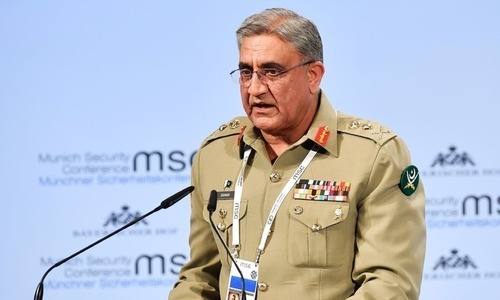ISLAMABAD: The request by the federal government before the Supreme Court to review its Nov 28 verdict on extension of the army chief’s tenure by a larger bench has sparked a debate among legal circles, with everyone eagerly awaiting the composition of the bench to hear the matter.
Will Chief Justice Gulzar Ahmed constitute a five-judge bench or a larger one, to be headed by himself, or simply decline the government’s request and fix the matter before the same bench consisting of the judge who authored the verdict and another senior judge with the chief presiding is the question being asked by everyone.
But everyone believes that time is ripe to end perceived institutional polarisation in the best interest of the country by sticking to the Constitution.
The federal government moved a review petition before the Supreme Court on Thursday to seek a review of the Nov 28 verdict in which a three-judge Supreme Court bench, comprising former chief justice Asif Saeed Khosa, Justice Mazhar Alam Khan and Justice Syed Mansoor Ali Shah, had held the extension granted by the government to Chief of the Army Staff (COAS) Gen Qamar Javed Bajwa would end after six months in case parliament did not legislate and determine his service tenure.
A perception is growing that since the petition of Riaz Hanif Rahi against the extension was poorly argued and not well represented, certain issues have cropped up in the judgement and needed to be addressed by the Supreme Court.
To constitute the bench is the chief justice’s discretion, but since the matter is of public importance, the decision should come after an open hearing, said a senior counsel.
The normal practice under Supreme Court rules is that the review petition is placed before the bench that heard the first one. The rules also suggest that the case be argued by the lawyer who earlier represented the petitioner unless the court allows a different counsel under certain circumstances.
In case a larger bench is constituted, the author judge against whose judgement the review is being sought will also be a member of the newly constituted bench, in addition to the third judge of the previous one.
The lawyers’ community, however, believes that any exercise carried out by the chief justice should be done with extreme care since it may lead to unnecessary speculations that an opportunity of fresh hearing is being afforded to dilute the effects of the previous decision.
But since the government’s petition has thrown up a number of questions, there is no harm if the case is heard at length to help reach a definitive conclusion, they argue.
The Supreme Court is on a winter break till Jan 5, although ordinary cases are being heard by different benches. It is likely that if the government’s petition is not fixed by next week, the case could be placed before a bench only after the vacations.
But all agree that unless the operation of the Nov 28 verdict is suspended, the government is obliged to implement the directives contained in it by invoking parliamentary proceedings for determining the service tenure of the army chief.
Failing to decide the matter in six months by parliament, the consequences envisaged in the judgement will follow, meaning the end of the extension period granted by the apex court to the army chief, they say.
During the period of former chief justice Asif Saeed Khosa, important and sensitive cases were fixed before the five-judge bench consisting of the most senior judges. If this practice is followed by the incumbent chief justice, the bench will consist of the chief justice himself, Justice Mushir Alam, Justice Umar Ata Bandial, Justice Mazhar Alam Khan and the author judge Justice Syed Mansoor Ali Shah.
But the discretion to constitute the bench is entirely with the chief justice, the lawyers concede.
Published in Dawn, December 28th, 2019















































